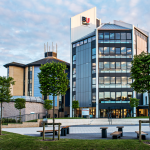Produced by Lindsay Anderson
This is a guest blog by current student Ed Richardson.
Ed Richardson is a Functional Consultant at Capgemini. He was offered a place on the company’s graduate scheme while still a postgraduate Information Technology student at Bournemouth University (BU), and is now planning to volunteer with BU’s alumni mentoring scheme. Capgemini encourages such involvement; ‘Giving Back’ is an integral part of their graduate scheme which they believe is of benefit to everyone involved.
Ed has been very impressed with how Capgemini (CG) supports professional development of staff. He saw this from his first interactions with the company. “On the Assessment Day, they are very much looking at your potential, rather than your current abilities. As an employee, you are assigned a buddy who contacts you even before you start work at CG and I will become a buddy to another new recruit” says Ed.
Having gained a first degree in Exploration Geology at Cardiff University, Ed went to work as a Delivery Unit Manager at the Royal Mail, running the Ringwood unit for a year. He then decided he wanted to pursue a more technical role and recognised he would need to develop more IT skills in order to do so. He says “I’m really happy I chose to study a Master’s in Information Technology at Bournemouth – it’s a great course. If I hadn’t gone to BU to study, I wouldn’t be where I am now.”
One of the ways Capgemini have supported Ed is by sponsoring the publication of his Master’s dissertation as an academic paper, Modelling a Smart Motorway. “Last summer, I was stuck in traffic while the never-ending upgrades to the motorways were happening” explains Ed. “I needed to research a modern-day problem and solve it for my dissertation and this got me thinking about what was actually happening to the motorway, and what else I could add to the design. I decided to model a Smart Motorway by building a simulator and designing a new Smart Traffic Light System.”
He continues “In the designing of systems, often the focus can be on the technical level, ignoring how the real-world impacts upon it. This is one of the key aspects I wanted to focus on. This model allows for factors such as when a driver randomly changes lane, regardless of other factors such as speed or traffic joining the motorway.”
Ed realises the potential impact of his research and explains that “the models I have designed for machine learning and automation focus on the behaviour of drivers but these could now be adapted in many ways, such as for big container ships which will also be automated in the future.”
Following the publication of his paper, Ed Richardson has also taken up an opportunity to present it in Sydney, at the thirteenth international confere nce on Complex, Intelligent and Software Intensive Systems. The conference proceedings have been published by Springer Publishing Company and Ed will now continue researching new ideas around his work and how they could be applied to provide practical benefits for the future.
nce on Complex, Intelligent and Software Intensive Systems. The conference proceedings have been published by Springer Publishing Company and Ed will now continue researching new ideas around his work and how they could be applied to provide practical benefits for the future.
Acknowledging the support he has received, Ed concludes “It was a really big opportunity to have my paper published, made possible with a combination of the support of my lecturers and my employer. I think if you are prepared to put in the effort, you will get the feedback to help you succeed.”
 Postgraduate Animation Courses in a Nutshell
Postgraduate Animation Courses in a Nutshell Why You Should Study Creative Writing
Why You Should Study Creative Writing How I got a paid placement in UK as an international student….
How I got a paid placement in UK as an international student….








